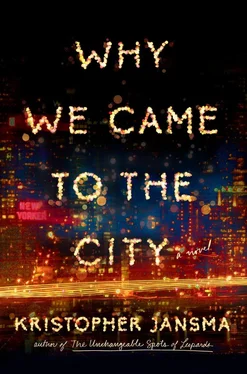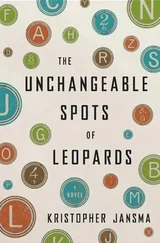She nodded and the doctor seemed satisfied. “If you don’t have friends you can trust with something like this, we can arrange—”
Irene stopped her quickly. “No, it’s not that. It’s — you know, my friends are great—”
Surely Sara would let them take out both her own eyes to save one of hers. Jacob and George would carry her to and from chemo appointments on their backs if she asked.
Dr. Zarrani seemed to know already. “Ms. Richmond, you can’t save them from this, I’m sorry.”
And that was when Irene, finally, began to cry.
Embarrassed, she looked down into her lap, the book of fairy tales still open to the page she’d been on when the doctor had entered. There was a beautiful silvery illustration of an enormous cloud over a still gray sea. It caught her so suddenly that for a second she forgot where she was and what she now knew. In the fairy tale, the North Wind was speaking to a Shining Fish who had no courage.
“ La speranza è l’ultima a morire ,” the North Wind said. Unlike Jacob she hadn’t failed the class. In fact she’d been one of the best students in the room, according to their teacher, Mrs. Marzocco, even though she’d gotten no credit for it or for any class.
The wind was telling the fish that hope is the last thing to die.
5
William, for the second time in four days, found himself at a party where he knew practically no one. First a suite at the Waldorf, now a basement apartment in Greenpoint that was jammed with actors. The ceiling was two inches above his head, and several others had to stoop. After the show, before William quite realized what was happening, Sara had whisked him onto the 7 train and then onto the G. William never felt comfortable being back in the boroughs. He’d grown up out here, after all, in Flushing. This felt like returning to dry land after months at sea. The buildings were too short; the streets too quiet. Driveways and fences! They’d followed the chummy cast members past Polish restaurants and a pencil factory and an odd, freestanding water tower like the sort you’d see in Kansas somewhere by the highway — to a little basement apartment with a hobbit-size door. One by one the actors had piled in and now were sitting around on the bare floor in a circle, drinking warm white wine from plastic cups and leaving periodically to smoke skunky weed in the back alley.
“I’ve recently begun listening to my whole hip-hop collection again,” one of them said to William. “Grandmaster Flash is a whole different experience on vinyl.”
The stranger wore a corduroy jacket and was drinking beer out of a brandy snifter, which William suspected he’d brought from home. Everyone else had plastic Solo cups and not, like, the nice ones. He reeked of pot and he kept smacking his lips together as if his beer were sawdust.
“I’m sorry,” William replied politely, “I don’t think we’ve met.”
The boy’s red eyes widened. “I thought you were someone else.” Then he backed away in a hurry and moved off across the room, before William could say that, once upon a time, he’d had a Run-DMC record himself.
George and the surly Jacob weren’t talking to anyone else either, but at least they had each other. They sat by the host’s bookshelves looking utterly exhausted and talking as if they’d been parted for weeks by dreadful battles. They exchanged stories of office politics, writer’s block, graduate research, and homeless panhandlers, all while wincing at the warm PBR cans in their hands. Every few minutes one of them would pull a hardcover down, remove the dust jacket and swap it with another from elsewhere on the shelf. Neither offered an explanation. William kept trying to excuse himself, but they were too engrossed in their talk of poems and planets to even look at him. He could have left, and they’d never have noticed, but he was still holding out that Irene would show up.
They had slept together three nights ago, after the last party with Sara and her friends. It was unusual for William. Not just to sleep with someone he’d met hours earlier, but to sleep with someone like Irene. He’d known while it was still happening that he’d never get over it. And things had gone well — at least he’d felt so at the time. But then in the morning he got the impression that perhaps it — no, that he had been a mistake. Not an error or a lapse so much, because neither of them had been very drunk. There had been no impairment. But a mistake and the sex had been merely a miscommunication, like a game of telephone played badly.
The next morning the excitement had been all about Sara’s engagement, and Irene had left after breakfast without even a kiss or a phone number. Now William guessed he was somehow supposed to act as if nothing had happened. As if he didn’t remember every microsecond of the evening, as if he hadn’t been replaying it on the 35mm film reels of his mind ever since. It felt a little shameful, really, as he’d watched it that afternoon right through a meeting with the partners and during a Sunday phone call with the London office, and on the walk home as he passed thousands of people on the sidewalks. But they couldn’t see it, he reminded himself — even if it were projected as high as the Empire State Building and as wide as the Battery. It was all in his head, and in the head of one other, who remained a ghost.
All weekend he’d been miserable and afraid to return Sara’s calls.
He drank deeply from his cup of warm wine and wished the red plastic container would, instead, swallow him up. He looked around the party and wondered if anyone would even notice if he spontaneously disappeared. It was a bit like watching the play. He was still there, in their audience, almost as if, hours ago, the curtain had gone down, the bows had been taken, the cheers had risen, and everyone in the orchestra and all the people in the mezzanine had gone home… but for the actors, the whole thing just went on and on.
“How was the show then?” George was asking. It took William a moment to realize that he was speaking to him.
“It was fine,” William lied, thinking that it would be rude to say otherwise in such a small room, filled with the very people who’d produced the play. They’d clearly worked hard and created something from nothing — wasn’t that praiseworthy?
Both George and Jacob stared at him, clearly expecting some elaboration. But William simply couldn’t think of a positive thing to say. He swayed a bit and tried looking at the ceiling where a bare bulb in a fixture dangled with great intent. But when he looked back, the boys were still waiting for him to speak. And William, exasperated at the party, at the days of waiting for Irene to call, at the bad wine — finally snapped.
“It was really, really awful. Really. God. Awful,” he confessed in a whisper. George and Jacob looked both delighted and not surprised. As William described the awfulness in detail, he tried to keep his voice down, but he soon realized it was utterly unnecessary — the actors were all so loud that they wouldn’t have heard him with a bullhorn in hand.
“All the dialogue was in rhyming couplets. Not sure why . Or why there was line dancing. And the guy who played Hades shouted all his lines. And, well, Eurydice couldn’t sing, so I have no idea why they put her in the lead role…”
George and Jacob each looked over at the girl in question, the frightfully thin hostess of the party, with breasts so enormous that her every movement seemed a complex balancing act.
Jacob commented wryly, “I can’t imagine.”
“You could count her ribs through a parka.” George concurred.
William went on to describe the highlight of the play: the moment when the actor playing Orpheus had slipped and crashed into Cerberus, whose three papier-mâché heads had gone flying into the wings.
Читать дальше












